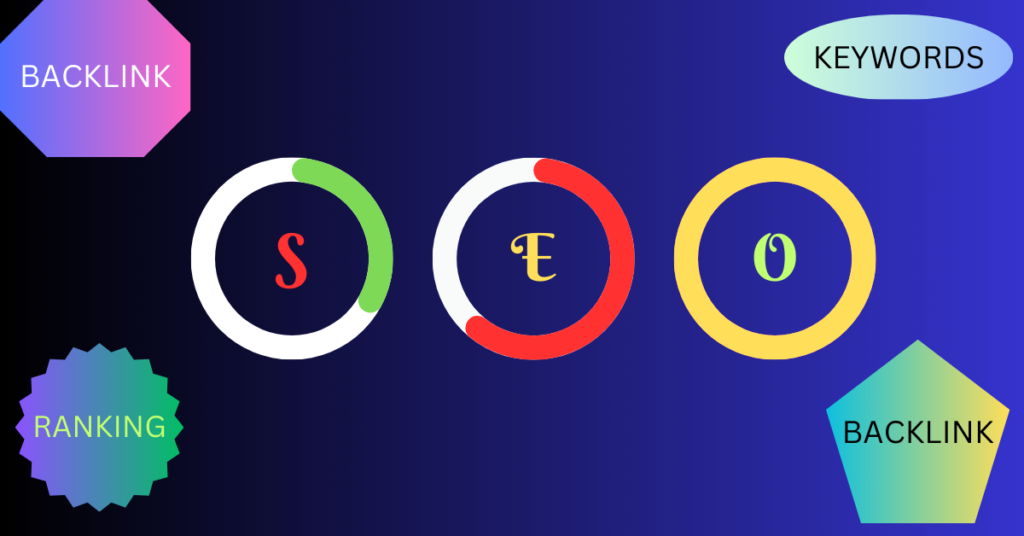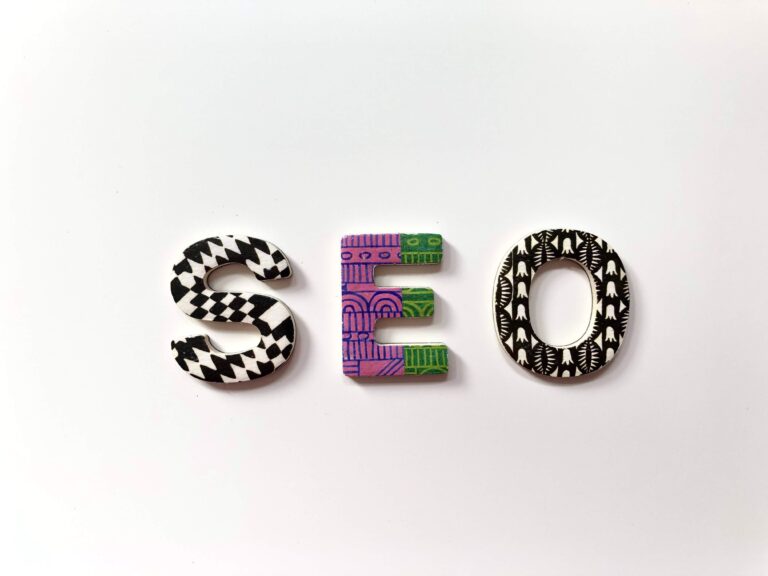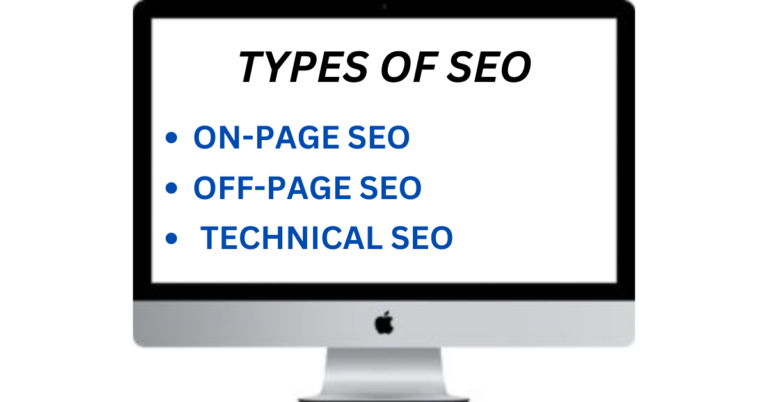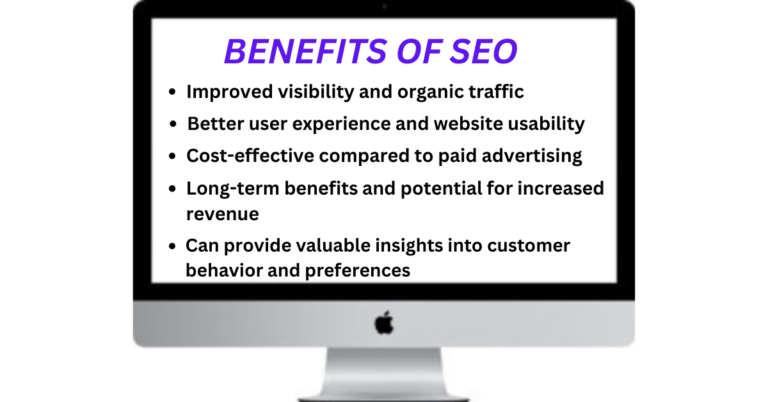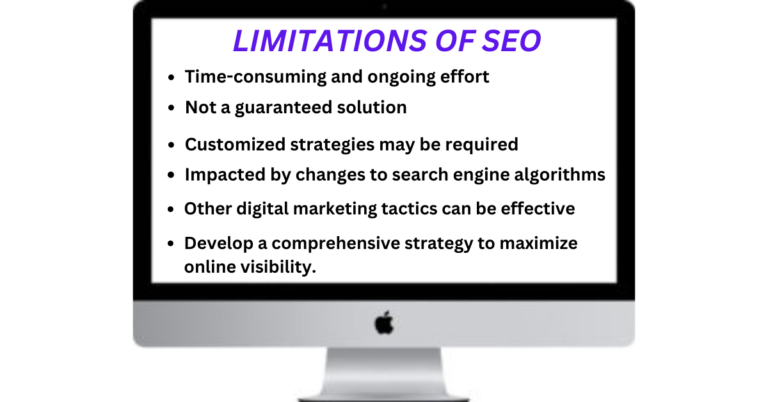Inside this blog:
Introduction: What is Search Engine Optimization (SEO)?
The Early Days of SEO: From Archie and Gopher to Modern-Day Algorithms
Modern-Day SEO: From Keyword Stuffing to Content Marketing
Google’s Algorithm Updates: From Florida to Panda, Penguin, and Hummingbird
The Rise of Mobile and Voice Search: Mobile and Voice Search Optimization
Types of SEO:
- On-page SEO
- Off-page SEO
- Technical SEO
Benefits of SEO:
- Increased Visibility
- Establishing Authority in the Industry
- Targeting Specific Audiences
- Cost-Effective Marketing
- Sustainable Results
Limitations of SEO:
- Time-Consuming Process
- No Guarantee of Results
- Difficulty in Measuring ROI
- Constantly Changing Algorithms
- Limited Control Over Search Engine Results
- Conclusion: The Evolution of SEO and its Importance for Online Marketing
Search engine optimization (SEO) is a process of optimizing a website to improve its ranking in search engine results pages (SERPs). The higher a website ranks in SERPs, the more likely it is to be seen by users and to attract organic traffic to the site.
The history of SEO dates back to the early days of the internet when search engines were first introduced to help users find information on the web. Early search engines, such as Archie and Gopher, were very basic and could only search for specific files on the internet. The algorithms used by these early search engines were also very basic and did not take into account the relevance or quality of the content on a website.
In the mid-1990s, search engines started to use more sophisticated algorithms that took into account the relevance and popularity of websites when ranking them in SERPs. This marked the beginning of modern-day SEO. Early SEO techniques included keyword stuffing and link building, which were used to manipulate search engines into ranking websites higher in SERPs.
In 1998, Google was launched, and it quickly became the dominant search engine. Google’s algorithm was much more sophisticated than its predecessors, and it was much harder to manipulate search results using traditional SEO techniques. Google’s algorithm relied heavily on links, and websites with a lot of high-quality inbound links tended to rank higher in search results.
In the early 2000s, SEO became more focused on creating high-quality content that would attract inbound links from other websites. This approach to SEO was known as “content marketing.” Instead of trying to manipulate search engines with keywords and links, website owners focused on creating valuable, informative content that would naturally attract links and improve their search engine rankings.
Google's Algorithm Updates:
In 2003, Google launched its first major algorithm update, known as “Florida.” This update penalized websites that used manipulative SEO techniques, such as keyword stuffing and link farms. The Florida update was a turning point in the history of SEO, as it signalled a shift towards a more user-focused approach to search engine optimization.
Over the years, Google has continued to refine its algorithm, with updates such as Panda, Penguin, and Hummingbird. These updates have focused on rewarding high-quality content and penalizing manipulative SEO techniques. Today, SEO is much more complex than it was in the early days of the internet. It involves a wide range of techniques, including keyword research, content creation, link building, and technical SEO.
The Rise of Mobile and Voice Search:
One of the biggest changes in SEO in recent years has been the rise of mobile and voice search. With the increasing use of smartphones and voice assistants, more and more people are using natural language queries to search for information on the web. This has led to the rise of “voice search optimization” and “local search optimization,” which are focused on optimizing websites for mobile and voice search queries.
Types of SEO
When it comes to search engine optimization (SEO), there are three main types to consider:
On-page SEO: Refers to optimizing elements on your website, such as content, meta tags, and HTML code, to improve search engine rankings and user experience.
Off-page SEO: Focuses on improving your website’s authority and reputation through link building and social media marketing, which can lead to higher search engine rankings.
Technical SEO: Involves optimizing technical elements of your website, such as website speed, mobile-friendliness, and site architecture, to improve search engine rankings and user experience.
Each type of SEO plays a crucial role in improving search engine rankings and overall digital marketing efforts. A well-rounded SEO strategy should include all three types and be tailored to the unique needs and goals of your business.
It’s important to note that SEO is an ongoing process that requires continual efforts and adjustments to maintain and improve search engine rankings over time. Working with an experienced SEO professional can help ensure your business is utilizing the right types of SEO for maximum impact and results.
Benefits of SEO
First and foremost, SEO helps businesses to increase their visibility online. When a website ranks high in SERPs, it is more likely to be seen by potential customers who are searching for the products or services that the business offers. This increased visibility can lead to more traffic to the website, which can translate into more leads, sales, and revenue for the business.
Another benefit of SEO is that it can help to establish a business as an authority in its industry. By creating high-quality, informative content that is optimized for relevant keywords, a business can demonstrate its expertise and knowledge to potential customers. This can help to build trust and credibility with these customers, making them more likely to choose the business over its competitors.
SEO can also help businesses to target specific audiences more effectively. By optimizing their website for specific keywords and phrases, businesses can attract visitors who are already interested in the products or services that they offer. This targeted traffic is more likely to convert into leads and sales, which can help to improve the overall ROI of the SEO campaign.
One of the most significant benefits of SEO is that it is a cost-effective marketing strategy. Unlike traditional advertising methods, such as television or radio ads, SEO does not require a large upfront investment. Instead, businesses can start small and gradually increase their SEO efforts as they see results. This makes SEO an excellent option for businesses of all sizes, including startups and small businesses with limited budgets.
Finally, SEO is a long-term strategy that can provide sustainable results. Unlike other marketing tactics that may deliver short-term gains, SEO is an ongoing process that can help businesses to maintain their online visibility and attract new customers over the long term. By continuously optimizing their website and content for search engines, businesses can stay ahead of the competition and continue to grow their online presence.
Limitations of SEO
While search engine optimization (SEO) can provide many benefits for businesses, it is not without its limitations. Here are some of the key limitations to be aware of when considering an SEO strategy:
Firstly, SEO can be a time-consuming process. It requires ongoing efforts to optimize a website and its content, and it can take time to see results. Businesses that are looking for quick results may find that SEO is not the right fit for their needs.
Another limitation of SEO is that it is not a guaranteed solution. While SEO can help to improve a website’s ranking in search engine results pages (SERPs), there are no guarantees that it will lead to increased traffic or revenue. Other factors, such as the competitiveness of the industry, the quality of the website’s content, and the behaviour of search engine algorithms, can all impact the effectiveness of an SEO campaign.
In addition, SEO is not a one-size-fits-all solution. Different businesses and industries may require different approaches to SEO, depending on factors such as their target audience, geographical location, and competition. This means that businesses may need to invest in customized SEO strategies that are tailored to their specific needs, which can be more costly than a one-size-fits-all approach.
Another limitation of SEO is that it can be impacted by changes to search engine algorithms. Search engines such as Google regularly update their algorithms to improve the quality of search results and prevent spammy tactics. These updates can sometimes impact the ranking of websites that have been optimized for previous versions of the algorithms, which can require businesses to adjust their SEO strategies accordingly.
Finally, SEO is not the only way to attract visitors to a website. Other digital marketing tactics, such as social media marketing, pay-per-click advertising, and content marketing, can also be effective at driving traffic and leads. Businesses that rely solely on SEO may miss out on potential customers who are using other channels to find products or services.
Conclusion:
In conclusion, search engine optimization (SEO) is the process of optimizing a website to improve its ranking in search engine results pages (SERPs). The history of SEO dates back to the early days of the internet when search engines were first introduced. Over time, SEO has evolved, and businesses that want to stay ahead must stay on top of the latest SEO trends and techniques to remain competitive. Benefits of SEO include increased visibility, establishing businesses as industry authorities, and targeting specific audiences more effectively, all while being cost-effective and providing sustainable results. However, SEO can be time-consuming and is not a guaranteed solution.
Top SEO Quotes
If you’re interested in learning about how Googledigit can ensure security for your Google Analytics and website data, feel free to fill out our online form. Our team of experts is always available to assist you with any questions you may have about our services. If you have any additional inquiries or would like more information, don’t hesitate to contact us directly at admin@googledigit.com

